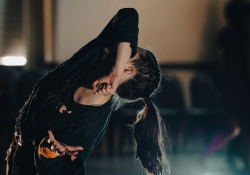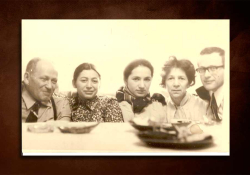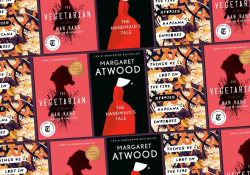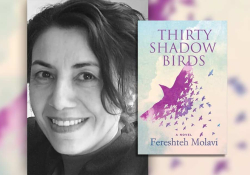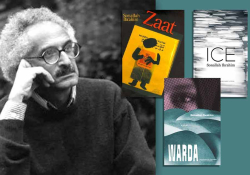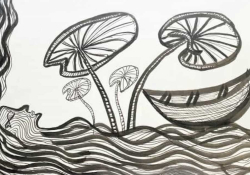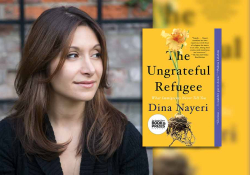The Winners
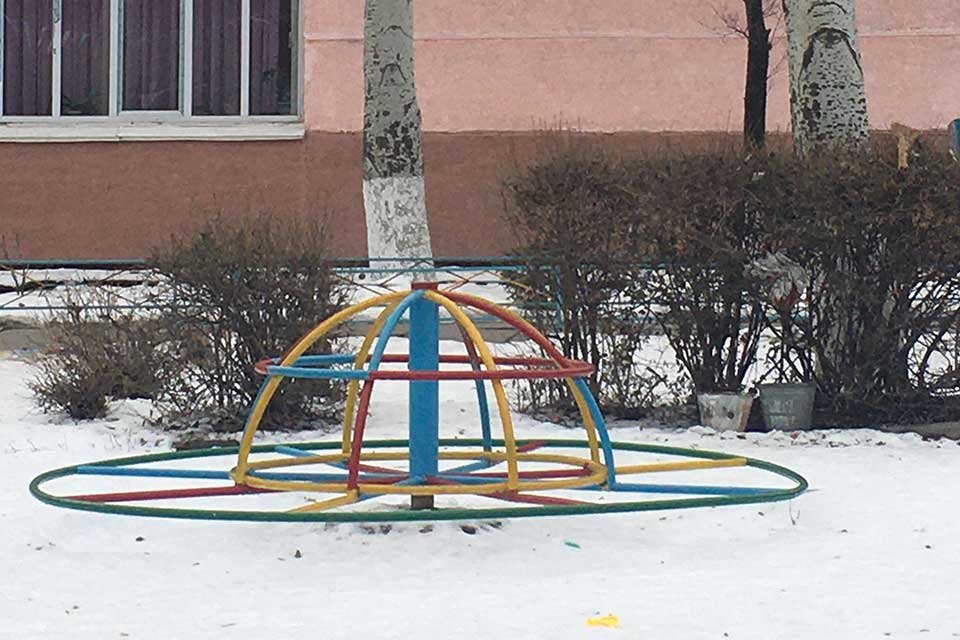
Judging an English Olympiad in Kyrgyzstan, the author witnesses her native tongue “being sliced and slivered like a summer melon” while the heart of each speech, the ideas expressed, remain untouched.
Someone must have told the students to wear only black and white that day because that was how they all were dressed, boys and girls both in white button-down shirts and black trousers, black skirts with thick black stockings, and incongruously heavy black boots because the early morning rains had turned to snow by the time the Olympiad was due to start that morning. And someone else, a teacher perhaps, had pressed onto each of their shirtfronts a thick strip of white tape on which was written the number by which they would be known for the duration of the competition. We were not allowed to ask for their names or the school they came from, and they were not allowed to tell us if we asked. These were the rules, though I never learned who had set them.
There were rules for us judges as well: we must write in red pen only, no pencil, no black ink, and only one of us was permitted to use the toilet at a time. This information was related to me by Aizada, the woman who had asked me to serve as a judge for the English Olympiad as she led me down the school hallways and to the classroom where the competition would take place. I had been asked to sit on the committee, the only non-Kyrgyz member of the judging panel, in the hope (so it was put to me) that having a native speaker would lend confirmatory weight to the final decision. It was intimated that there had been incidents in past years: conflicts, errors.
To my right hung a diagram of Russian verbs in the form of a smiling hedgehog: its snout the prefix, its belly the root.
And so that morning I had risen early, had gone from where I lived in the far south of Bishkek to Gymnasium 31 in the center of the city, riding a crowded marshrutka down increasingly icy roads until I got to Pavlov Street. The foyer of the school was full of teachers and parents, the air damp and hot with the heat of so many expectant bodies. But the classroom itself was quite cold when we reached it, Aizada and I and the rest of the judges, and as we moved the desks and arranged the testing materials I was conscious of just how large the space was for the few of us who now occupied it, how strange it would be for the students to come in one by one and speak into that great emptiness. The walls were pale green, the chalkboard a deep oxidized red the color of calf liver. To my right hung a diagram of Russian verbs in the form of a smiling hedgehog: its snout the prefix, its belly the root. We had not finished reading over the scoring system by the time the door opened and the first student was ushered in by an unseen administrator to begin the examination process, but it seemed that this was beyond our power to control.
*
“Dwell upon the following statement as you understand it,” the speaking prompts began. “In the end it’s not the years in your life that count, it’s the life in your years.” Or: “I have found that if you love life, life will love you back.” Or: “Never regret anything that made you smile.” Some or other such statement would be assigned to each student, who selected one at random upon entering the room as though they were drawing for the lotto, and they would be tasked, for four minutes, with expounding upon it. “It is true,” they might begin. “You should love like you’ve never been hurt. You should dance like nobody’s watching.” There were multiple references to Steve Jobs, to Elon Musk, to the importance of cultivating one’s “soft skills” and “focusing on the positive.” But alongside the TedTalk polish, the confident declaratives, it was possible to discern the trembling of hands as they gestured and pointed. I was not so far removed from them in age: I remembered my own high school competition days, the infinite waiting in infinite hallways, nerves so intense they reached the point of physical illness. During the Q&A portions, I would do my best to encourage them, mixing in bits of praise with the questions I put to them. But my smiles went unreturned. I am trying to be their ally, I thought to myself; instead, I am simply putting up more obstacles for them to overcome. Looking out the window during a lull between speakers, I thought that perhaps I should not have come that day after all. The snow was falling harder now. Gymnasium 31 was down the street from Osh Bazaar: occasionally I could hear the warble of the market’s loudspeakers as they advertised vacant apartments in the adjoining districts.
There was a boy who devoted his entire speech to underwater orienteering. There was a girl with a Canadian father whom angry parents petitioned to have disqualified. As the last contestant rose to leave, the day’s final speaker in the day’s final group, the light caught the pins at the waist of her too-big skirt and set them glinting like stars. Done for the afternoon, we were given plov and hot apricot compot in the lunchroom, summer-sweet though we had to wear our scarves inside: the broad windows, which in springtime must have given onto enviable views of the tree-filled courtyard, today let in only cold. Discussing the speeches that had been presented that day, we clutched our mugs tight to warm our hands, pressed them to our cheeks before we sipped. The committee was not permitted to assess the content of their speeches but merely the words in which the content was conveyed. As Gulbara noted slips into informality, as Begimai compared vocabulary levels, I began to feel like I was witnessing my native tongue being sliced and slivered like a summer melon: the prizing apart and weighing up of syntax, grammar, diction.
The grading system we were told to use dinged pauses, self-correction, any sign that the student was registering and reconsidering what they were saying as they said it.
Yet the heart of each speech, the ideas expressed, remained untouched. The grading system we were told to use dinged pauses, self-correction, any sign that the student was registering and reconsidering what they were saying as they said it—but why, I now wondered as two of the other judges debated rankings, should we privilege fluency over self-reflection? None of the students had chosen to disagree with the statements they were presented with; all of them, asked to assess a piece of banal self-help wisdom, had responded with banal pieces of self-help wisdom of their own, culled from what or where I did not know. At a certain point it had become impossible to discern if many of them believed what they were saying, if they even understood it—or, indeed, if there was anything there to understand. Can language be cloven from thought? If language is a means of expression—and not merely an amorphous substance to be poured into the great empty vessel of time—how do we evaluate it when it expresses nothing?
Wading through the stall-crowded streets that ringed Osh Bazaar after the first day of judging had concluded, I boarded a marshrutka bound for Microdistrict 12 with Sabira, another one of the members of the committee. She taught English at a local university and during the Q&A portions had asked the students about their dreams for the future. “What is your favorite transition word?” she asked me as the marshrutka bore us toward the south. Hers, she said with genuine warmth, was “specifically.” Her students loved it too. She had been in an English Olympiad as a girl, she told me—had gotten third place at the city level in Jalal-Abad, one slot away from earning a spot in the national competition. She spoke as though she still felt the sting of the loss, as though the moment when she had been told to smile and be grateful while the two children next to her marched forward to receive a prize she was denied had happened just that afternoon, was happening still, in the room adjoining the one in which we had sat in solemn judgment.
*
By the second day of the Olympiad we had grown familiar with the bureaucratic ritual: the committee would go into the classroom and arrange the desks into the proper formation. A few minutes later one of the officials would come and present us with an envelope containing the testing materials, gesturing at the twin blue seals in the manner of a priest processing a holy monstrance for the worshipful crowd to see. Then the seals were ripped, and then we would begin.
“Short stories not clearly divided into four paragraphs will receive a deduction,” Gulbara instructed us when we started marking the writing section. Sabira protested—how could we say that a work of fiction had to have a certain number of paragraphs, topic sentences, a conclusion?—but Gulbara pointed to the rubric: it was all there on the sheet that had been handed down to us in its official double-sealed envelope. The system was unbending. Zero in grammar if there were four or more errors, however small; no points awarded if a word was spelled wrong, even by a single letter. There were two separate categories for structure and organization, the distinction between which eluded us all. Increasingly, as I made comments or asked questions of the other judges, I grew conscious of the slips in my own English: the “wrong”-but-common usages that leak into everyday speech, sentences that switch tack halfway through or fade out into nothing, bits of inarticulacy swept under the rug of conversation. With each of these I imagined my points trickling away, red pens painstakingly scribbling down every one of my errors as they came.
Evening, and we had still to be released: over coffee and potato buns, we bided our time making idle guesses about what the outcome of the Olympiad might be. Would #020442 win, or would #020449 edge him out in the end? And had the girl with the Canadian father been disqualified after all? As we spoke, I became aware of the gulf between our grading criteria. All of us were first-time judges; none of us had known the grammar of the system coming in. The packets of instructions we had received—authored by whom we were never informed—raised in us as many questions as they answered.
Left to our own devices, with a mound of grading and limited time in which to complete it, each of us had found our own way of sizing up the language that lay before us. What was Sabira looking for, who so loved to ask the students about their dreams? What was Gulbara looking for, who during the question-and-answer portion would test their knowledge of Russian proverbs? What was Temirlan looking for, who for the entirety of the proceedings said nothing at all, who arrived late, left early, who openly professed a dislike for teaching English, and who during our coffee break handed out business cards for the print shop he ran on the side? And what was I myself looking for, who could not even read the lengthy rubric for grading the speeches because it had not been translated into English?
Perhaps what we all were judging was not even language at all, I thought, but something beneath and beyond it.
Perhaps what we all were judging was not even language at all, I thought, but something beneath and beyond it, some abstract measure of the performance of studenthood that we would be hard-pressed to articulate if asked but that—just as in their speeches each had placidly assented to the imposition of sweet simplicity onto a world that is both chaotic and cruel—lay somewhere in the patient acceptance of a system that is tightly rule-bound and beyond the ultimate understanding of anyone involved.
Someone else totted up the scores; someone else submitted the forms to the officials. We never learned the names of the winners. In another part of the school, down the hall or on a different floor perhaps, the results were being announced: awards were being given, and the winners were standing tall before the crowd for photographs in their nice clothes, numbers still plastered to their shirtfronts. But this was not for us to see, we judges who now rearranged the tables and disposed of our notes as though nothing had happened here at all. Temirlan gave me a lift to Kievskaya Street, and from there I took the number 10 bus home.
Bishkek, Kyrgyzstan


